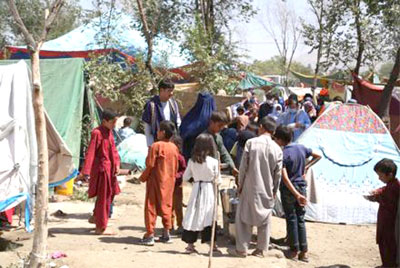The Norwegian Refugee Council on Thursday in a report said the economic measures imposed on Afghanistan are preventing aid agencies from moving funds into and within the country which has put millions of people at risk because they are blocked from receiving emergency relief.
According to the report, it is impossible for the humanitarian organizations to help millions of in-need people with humanitarian assistance, unless the US Department of Treasury and other donor agencies take actions towards enabling the banks to facilitate humanitarian financial transfers and support Afghanistan’s central bank to resume its core functions.
“The unresolved liquidity crisis is a key driver in what is becoming the worst humanitarian catastrophe in the world. We recently called for USD 4.4 billion for starving Afghans – the biggest call of its kind in the history of humanitarian work. But unless the US Treasury and other Western financial authorities enable us to transfer the aid money, we will be forced to work with our hands tied, unable to get that money to the communities who desperately need it,” warned Jan Egeland, NRC’s Secretary General.
According to NRC, 23 million people in Afghanistan are facing acute hunger and the public services are on the brink of total collapse. The report says amid this situation, aid agencies are unable to scale up lifesaving operations because formal financial channels into the country are almost completely blocked.
The report says while the licenses issued by the US Department of Treasury and the exemption of sanction by the UN on humanitarian assistance are good steps for supporting the people of Afghanistan but are not enough.
“Millions of Afghans will suffer unimaginable consequences unless the Afghan central bank is provided with sufficient support to resume its key functions, including the purchase and circulation of bank notes, with appropriate safeguards in place. Unless this happens, we will struggle to respond to this crisis and the country’s economy will continue to skydive,” said Egeland.
NRC has urged the US and European governments to support banks in allowing transfer of money into Afghanistan and also the aid agencies to withdraw those funds once reached in Afghanistan.
NRC’s report comes amid the UN and some other international humanitarian agencies have also warned of a humanitarian crisis in the country.
The UN also on Wednesday said it has launched its One-UN Transitional Engagement Framework (TEF) to assist the people of Afghanistan in 2022 through sustaining essential services and preserving essential community system.
“This UN system wide strategy will help ensure that Afghans can meet their basic human needs; acting on this now is more important than ever to avoid that an even wider proportion of the population requires lifesaving humanitarian assistance. It’s especially important now as millions are suffering with the harsh winter months, and we thank the international community for stepping up their vital support to the Afghan population,” said UN Resident and Humanitarian Coordinator for Afghanistan Dr. Ramiz Alakbarov.
Meanwhile, displaced families living in a camp in the capital city of Balkh province have sold their children and their kidneys for funds to survive.
The displaced families escaped heavy conflict between the Islamic Emirate and former government forces before the fall of the republican government in the northern provinces of Balkh, Sar-e-Pul, Faryab and Jawzjan. A charity committee is helping displaced families with food and cash aid in order to dissuade them from selling their children and kidneys.
The price of a child is between 100,000 to 150,000 Afs and the price of one kidney is 150,000 to 220,000 Afs. The families are living in a camp in Mazar-e-Sharif, the capital of Balkh province.
The families said that they were forced to make such decisions due to poverty, the economic problems in the country as well Covid-19’s outbreak.
“We are overwhelmed with problems. No one pays attention to us. We are in deep trouble,” said a displaced person. Every family has around two to seven children.
Dilbar is a war-displaced person whose family is struggling with starvation. Dilbar said she had no choice but to sell her kidney to take care of her children.
“I was rescued by my operation. My child was sick. I took her to the hospital for treatment but the doctors told me her treatment would not be done,” she said.
These families were helped by a charity committee to stop them from selling the kids and kidneys.
The charity committee provided cash aid and food for thousands displaced and vulnerable people in Mazar-e-Sharif.
The head of the charity committee, Mohammad Sadiq Hashimi, called on national business people to boost efforts to help the people in need across the country.
“There were some sisters who were ready to sell their kidneys – some of them have already sold their kidneys. I saw some families who were selling their children. We were able to help them,” he said.
The Islamic Ulema and residents of Balkh urged the international community to provide humanitarian assistance to the Afghans as the country is going through a severe humanitarian catastrophe.










